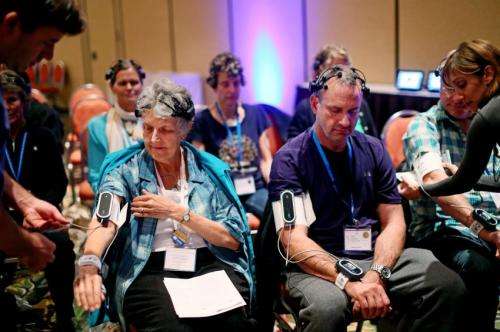Wireless sensors used to study meditation's effect on heart health

Demystifying meditation with science, researchers at the Scripps Translational Science Institute (STSI) have teamed with The Chopra Foundation and The Chopra Center for Wellbeing in a novel study of the ancient practice that uses wireless health sensors to collect physiological data from meditators.
"Although the health benefits of meditation have been extensively studied, little is known about the immediate effects of meditation on the heart and vascular system, partly because of the difficulty collecting research quality data through conventional means," said Scripps Health Director of Digital Medicine Steve Steinhubl M.D. "Wireless devices offer new ways to track blood pressure, heart rate, body temperature and other vital signs in a more discrete and non-disruptive way."
STSI is a National Institutes of Health-sponsored consortium led by Scripps Health in collaboration with The Scripps Research Institute. Through this innovative partnership, Scripps is leading the effort to translate the latest wireless and genetic medical technologies into high-quality, cost-effective treatments for patients.
Meditation has long been associated with lower levels of stress and increased emotional well-being, but its immediate effect on the cardiovascular system remains uncertain. A 2007 report by the federal Agency for Healthcare Research and Quality found flaws in most of the 813 meditation studies that were reviewed, and the authors were unable to draw "firm conclusions" about the role of meditation in health care.
"For thousands of years people have practiced meditation to experience inner calm, relieve stress and cultivate balance or what is known in modern medicine as homeostasis, which is the body's ability to regulate its internal conditions and create a healthy, stable environment," said Chopra Center co-founder Deepak Chopra, M.D. "We're excited about the opportunity to use wireless technology to gain more scientific data about meditation's tangible benefits for health and wellbeing. This research has great potential value for both meditators and physicians whose patients might be helped by meditation."
The STSI study might for the first time demonstrate the immediate influence of meditation on blood pressure and markers of stress, and eventually guide better and more individualized treatments of high blood pressure, chronic pain or other health conditions, said STSI Director and Scripps Chief Academic Officer Eric Topol, M.D. "With STSI's experience and expertise in digital and individualized medicine, we hope to offer advanced insight into the body's response to meditation," he said.
The work also could reinforce the value of using wireless health devices in scientific research, particularly when more conventional equipment would interfere with the normal activities of study participants.
The 40 participants in the meditation study recently attended a weeklong retreat that was led by Dr. Chopra at his center in Carlsbad, Calif. Half of the participants were experienced meditators while the others were newcomers to the practice.
Three wireless health devices were attached to the participants. The ViSi Mobile System made by Sotera Wireless monitored blood pressure and heart rate, employing continuous non-invasive blood pressure (cNIBP) and electrocardiogram technologies. The Emotiv EEG tracked brain electrical activity through 14 channels. The HealthPatch made by Vital Connect recorded heart rate and its variability, respiratory rate and skin temperature.
Participants were tracked through the devices in real time for 40 minutes during a meditation session on the first day of the retreat and again for 40 minutes during a meditation session on the last day. The devices generated massive streams of data – more than 1 million data points per minute for each individual – that were securely collected through a special wireless infrastructure set up by Burwood Group, a technology consulting firm headquartered in Chicago with offices in San Diego. The data were stored in cloud-based servers operated by Huneo, a Cleveland health data processing company.
Study participants ranged in age from 20 to 72 and came from as far away as Columbia, Denmark and Belgium to attend the retreat.
Edei Ledet of Vista, Calif., was among the meditation novices who took part in the research.
"I had a life crisis that made me reevaluate what I was doing both for my work and how I was taking care of myself," she said. "I started learning meditation about eight months ago, and from my experience so far it has been enormously helpful in healing emotionally and physically.
"I believe research in this area is vital to gaining a better understanding of how the brain, body and mind are connected. So I was really happy to be part of the STSI study," Ledet said.
STSI researchers expect to report results from the study next year. Funding for the study was provided by the Chopra Foundation and through in-kind device donations from Sotera Wireless, Emotiv and Vital Connect.
















